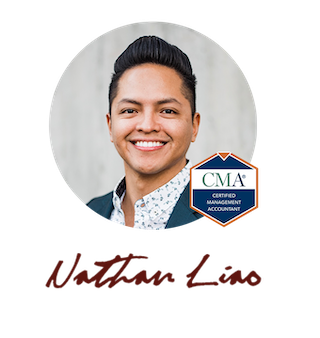As an accountant, there are several paths you can choose when it comes to accelerating your career. We talk about the CMA often here, but two similar choices might be right for you – CGMA and ACCA.
These certifications offer similar career trajectories and salaries, but there are key differences that could allow you to thrive with one in particular.
In this article, I’ll discuss these three designations for accountants. Their associated organizations, the requirements and costs associated with each, and how much time you’ll spend studying. Plus, the different professional development opportunities and expected salaries for each.
In this article:
- Accounting Designations Explained
- Getting a Certification
- Cost of Certifications
- Exam Difficulty
- Time Engagement
- Professional Development Opportunities
- Expected Salary
- Which Is the Best Accounting Certification?
Fee Type | CMA | CGMA | ACCA |
Requirements |
|
|
|
Exam Difficulty | Pass rate around 50% for each part |
| Varies by exam, rangina from 40% to 84% |
Time Engagement |
| About 120 hours of learning content per module | 2 to 4 years for 13 exams |
Career Development |
|
|
|
Average Salary | $110,000 | $118,000 | $43,000 |
Accounting Designations Explained
First, let’s discuss each designation.
What Is CMA?
The Certified Management Accountant (CMA) designation is a prestigious professional certification offered by the Institute of Management Accountants (IMA).
CMA is a globally recognized qualification focusing on management accounting, emphasizing skills and knowledge crucial for financial planning, analysis, and strategic decision support within organizations.
CMA candidates are required to pass a two-part exam that covers various topics, including:
- Financial Reporting
- Cost Management
- Performance Measurement
- Budgeting
- Risk Management
- Professional Ethics
This certification is highly regarded by employers worldwide, making it an excellent choice for individuals seeking careers in management accounting, financial analysis, and strategic financial management.
CMA professionals often play critical roles in helping organizations make informed financial decisions and optimize financial performance.
What Is CGMA?
The Chartered Institute of Management Accountants (CIMA) qualification, now called Chartered Global Management Accountant or CGMA, is a globally recognized credential offered by the UK-based Chartered Institute of Management Accountants and the AICPA.
The CGMA focuses on management accounting and strategic management. It equips candidates with the skills and knowledge needed to excel in roles related to financial strategy, risk management, performance evaluation, and business analysis.
CGMA’s syllabus includes:
- Financial Strategy
- Management Accounting
- Organizational Management
- Business Ethics
It’s particularly well-regarded in the UK and Europe, though it also enjoys recognition worldwide.
Organizations often seek out CGMA professionals for their expertise in helping make strategic financial decisions, manage risk, and achieve sustainable growth.
This qualification is an excellent choice for those aspiring to work in management accounting and strategic financial management roles in various industries.
What Is ACCA?
The Association of Chartered Certified Accountants (ACCA) is a globally recognized professional qualification.
ACCA is known for its comprehensive and versatile approach to accounting and finance. It covers various subjects, including:
- Financial Accounting
- Management Accounting
- Taxation
- Auditing
- Business and Corporate Law
ACCA’s holistic curriculum provides a well-rounded education in accounting and finance, making it suitable for individuals looking to pursue diverse career opportunities in the field.
ACCA professionals are equipped with the knowledge and skills necessary for roles in accounting, auditing, taxation, financial management, and even business consulting.
This qualification is highly respected and valued by employers worldwide, offering flexibility and a broad foundation in the accounting profession, making it a popular choice for aspiring accountants seeking a global career.
Getting a Certification
Next, let’s look at what it takes to earn each certification.
Becoming CMA Certified
To become a CMA, you’ll meet the following requirements:
- Educational Eligibility: You must have a bachelor’s degree from an accredited institution or an equivalent professional certification.
- CMA Exam: You need to pass a two-part CMA exam, which covers topics like financial reporting, cost management, performance measurement, budgeting, risk management, and professional ethics.
- Experience: You must have at least two years of consecutive professional experience in management accounting or financial management.
- Membership: You’re required to become a member of IMA, the certifying body for CMA.
Becoming CGMA Certified
To attain CGMA certification, you’ll need to complete the following steps:
- Educational Eligibility: You need to have a bachelor’s degree or the equivalent, typically in business, finance, or accounting.
- CGMA Qualification: You must complete the CGMA qualification, which consists of three levels: Operational, Management, and Strategic. Each level includes exams and case studies.
- Practical Experience: You need to acquire three years of relevant practical experience, typically through employment in accounting or finance roles, as part of CIMA’s Practical Experience Requirement (PER).
- Membership: You must become a member of CIMA and/or AICPA.
Becoming ACCA Certified
To achieve ACCA certification, you’ll need to meet the following requirements:
- Educational Eligibility: There are no strict academic requirements to start ACCA, but having a solid foundation in accounting or finance is beneficial.
- ACCA Exams: You must pass 13 exams, which are divided into three levels: Applied Knowledge, Applied Skills, and the Strategic Professional level. The exams cover various aspects of accounting and finance.
- Practical Experience: ACCA requires you to complete an ethics and professional skills module and gain three years of relevant work experience in finance, audit, or other accounting roles.
- Professional Ethics: You need to demonstrate a high level of professional ethics and integrity.
- Membership: After completing the exams and practical experience, you can apply for ACCA membership.
Cost of Certifications
Now, let’s discuss the cost of each certification.
CMA
The IMA updated the price of the CMA exam in October 2023. The total cost of the CMA exam is $1,320 for professionals and $995 for students.
For professionals, this breaks down to $495 for Part One, $495 for Part Two, and a $300 entrance fee.
Another CMA exam cost is your IMA membership fee, which is $295 for professionals and $49 for students.
CGMA
The annual CGMA Finance Leadership Program membership fee of $495 includes the exam cost. In addition, this membership fee covers the cost of study materials, but it doesn’t cover the cost of an exam retake.
ACCA
The cost of the ACCA certification exam is a bit more complex. The initial registration fee is €89, and the annual subscription fee is €122.
Each Applied Knowledge exam has a different cost depending on your location and where you take the exam. When you take the Applied Skills exams, each exam costs €142. The Ethics and Professional Skills module is €75.
The ACCA website has a comprehensive fee breakdown according to your location.
Exam Difficulty
The difficulty of the CMA, CGMA, and ACCA exams can vary from person to person based on individual circumstances, including your background, preparation, and familiarity with the subject matter.
Let’s look at the pass rate for each certification exam.
CMA
The CMA exam is taken in two parts, each with a similar pass rate in recent years. The exam is fairly difficult, with 50% of people who take the exam passing each part.
CGMA
The CGMA exam comprises three parts–Operational, Management, and Strategic. In August 2023, the pass rates were 69%, 58%, and 48% respectively.
ACCA
Several exams make up the ACCA, each with a different pass rate. For Applied Skills in September 2023, pass rates range from 40% for Performance Management to 84% for Corporate and Business Law.
For the Strategic Professional exams, the pass rates range from 34% for Advanced Performance Management to 50% for both Strategic Business exams.
The numbers vary widely, but the ACCA qualification exams are rigorous and prepare students for a rewarding career.
Time Engagement
The CMA, CGMA, and ACCA all require a different amount of study hours.
CMA
The IMA has laid out a structured guide for study time. On average, Part One requires 170 study hours, and Part Two takes 130. If you commit to a specific amount of study time each week, between 12-20 hours, you can sit for both parts of the exam between 16 and 25 weeks.
Spoiler: CMA Exam Academy can get you there in 16 weeks.
CGMA
You need three years of professional experience to become CGMA certified, which can be done concurrently with your studying and exams.
The CIMA has an online resource that contains 120 hours of learning content for each module, so you can expect to spend about that long studying for the exam.
ACCA
The ACCA exam comprises 13 parts, and according to the London School of Business and Finance, you can expect to spend one to five years studying and passing the exams.
Professional Development Opportunities
Professional development opportunities for individuals who have obtained the CMA, CGMA, or ACCA certifications can lead to diverse and rewarding career paths in accounting and finance.
Here are some of the professional development opportunities for each of these certifications.
CMA
Where can CMAs take their careers?
- Advanced Roles in Management Accounting: CMAs often advance into roles such as Chief Financial Officer (CFO), Controller, or Finance Director, responsible for strategic financial decision-making, budgeting, and performance analysis.
- Specialization: CMAs can specialize in cost accounting, risk management, or strategic decision-making deepening their expertise in specific domains.
- Leadership Positions: With their strong financial acumen and understanding of business operations, CMAs are well-equipped to assume leadership positions within organizations.
- Global Opportunities: CMAs are recognized internationally in 150 countries, which opens up opportunities for working in various countries and multinational corporations.
CGMA
What does CGMA offer for career growth?
- Strategic Finance Roles: CGMA-certified professionals often pursue careers in strategic financial management, business analysis, and risk management. They can hold positions such as Financial Director, Finance Manager, or Management Consultant.
- Business Leadership: CGMA equips professionals with a strong understanding of business operations and strategy, making them well-suited for leadership roles.
- Management Consulting: CGMAs often transition into management consulting, helping businesses make informed strategic decisions.
- Global Reach: CGMA has a solid global presence, providing opportunities for working with multinational organizations and in diverse geographical locations.
ACCA
How does ACCA help you advance as an accountant?
- Versatile Career Options: ACCA opens doors to various career paths, including roles in accounting, auditing, tax, finance, and consulting.
- Public Practice: Many ACCAs choose to work in public practice, often pursuing careers in accounting firms and audit practices.
- Corporate Finance: ACCA-certified individuals can work in corporate finance, investment analysis, and financial planning.
- Financial Leadership: ACCA members often rise to economic leadership positions, such as Finance Director or Chief Financial Officer.
- Regulatory and Compliance Roles: ACCA-qualified individuals can work in regulatory and compliance roles, helping organizations adhere to financial regulations.
In addition to these career opportunities, professional development for CMA, CGMA, and ACCA often involves continuous learning and staying updated on the latest developments in accounting and finance.
Many professionals choose to further their education, earn additional certifications, and engage in ongoing professional development activities to advance their careers and stay competitive.
The specific opportunities may vary based on individual career goals, but these qualifications provide solid foundations for successful careers in accounting and finance.
Expected Salary
Salaries for CMAs, CGMAs, and ACCAs in the United States can vary based on factors such as:
- Experience
- Geographic location
- Industry
- Level of responsibility
However, having these professional certifications typically leads to higher earning potential than similar roles without certifications. Below, I’ll provide a general overview of the average salaries for professionals with these qualifications in the United States.
CMA
In the United States, you can expect a median base salary of around $110,000 for CMAs. The highest-paid CMAs in the Americas make at least $170,000, and the average salary, including bonuses, is around $124,000.
Entry-level CMAs will typically earn lower salaries, but you can expect to continue to earn more as your career progresses–you will be in demand due to the CMA accreditation.
CGMA
The CGMA credential can increase your salary compared to your colleagues without certifications. For a financial controller, the average salary is $89,000, while the average salary for a financial controller with a CGMA is $118,000.
ACCA
ACCA is more of a global designation, so it’s tricky to compare to US salaries. Fully qualified ACCAs earn around $43,000. This doesn’t come close to the salary of CMAs or CGMAs.
Which Is the Best Accounting Certification?
While all three qualifications are valuable for accountants, the choice between CMA, CIMA, and ACCA depends on your career goals, the specific areas of accounting you wish to specialize in, and your geographic location.
CMA and CGMA certifications have a stronger emphasis on management accounting and strategy, while ACCA offers a broader education in various accounting and finance disciplines.
Each of these qualifications has its own strengths and global recognition, so consider your career aspirations when deciding which one is the best fit for you.
If you think CMA is the best choice for you, leave a comment below with any additional questions or check out our 16-week Accelerator program.
I can help you pass the CMA exam on your first attempt in only 16 weeks and guide you toward a new and exciting career path.

Hi, I’m Nathan Liao (aka the CMA Coach)! For the last 10 years, over 82,000 accounting and finance pros came knocking at my door seeking guidance and help. If you’re also aiming to conquer the CMA exam on your very first try—without wasting away time or money—you’ve found your ultimate guide. Dive in deeper to discover more about me and the dedicated team that powers CMA Exam Academy. Click here and let’s embark on this journey together!



2 Comments on “CMA vs. CGMA vs. ACCA”
I would like to sit for the CGMA exams
Hi Victor,
For more information on CGMA certification, please contact the respective institutions directly.